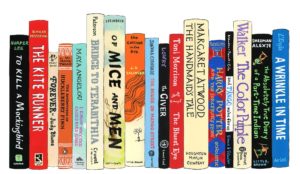
What do books like The Great Gatsby, The Catcher in the Rye, Lord of the Flies, The Color Purple, Lolita, and Slaughterhouse Five have in common? Many may say they are all influential and powerful pieces of literature that have been studied and analyzed across the world. This may be true in some aspects, however, what else these books have in common is they have been banned from circulation in many public and private schools and libraries. These books are censored particularly from the youth who are the ones who need to read them the most. Not only is the banning of books a blatant infraction of the constitutional right of freedom of speech and expression, it takes away the ability for the growing youth to be able to interact with ideologies, situations, and emotions they would never be able to otherwise. The exposure to themes like drugs, alcohol, violence, sexuality, racsim, suicide and more, through literature allows the reader to understand and empathize with those that are unalike from themselves, or to potentially regonize a piece of their own experience within the writing.
An example of why a book like Slaughterhouse Five by Kurt Vongaut is banned in many communities and even burned in others is because it “contains and makes references to religious matters” and “book’s explicit sexual scenes, violence, and obscene language” (ALA). The excuses here as to why this book cannot be read are all the reasons I believe it should be, as these situations and the emotions that come with them beautifully written in these classics are a part of the true human experience, and allows us to further analyze our own behaviors and emotions or those of others around us.
Organizations like the American Library Association (ALA) are huge proponents for allowing the reading and circulation of all books, especially those that have been banned. They now have many free book downloads on their website along with ways to get involved with end censorship of art literature. As they believe and so do I, that something so beautiful as books, as art literature, can never be criminal and should always be free.
Sources:
American Library Association. “Banned & Challenged Books.” Advocacy, Legislation & Issues, 20 Feb. 2020, http://www.ala.org/advocacy/bbooks.







It is crazy to believe that people want to ban books in general. However, some schools, institutions, or states don’t want individuals to have certain problematic beliefs or learn certain themes. These books highlight the problems in society and question the world around us. It is interesting that “Slaughterhouse Five” by Kurt Vonnegut is banned when it brings up the negative impact of being in war. Billy dealt with PTSD and was looked down on for his “broken mindset”. He believed in the Tralfamadorians, who were aliens who abducted him, in order to make sense of the world around him. This book is important for children to read because it reveals the hardships of mental health and the truth of war. It is relieving that there are organizations such as the ALA that have free book downloads so anyone can read them. Censorship of books only brings us closer to the reality of “Fahrenheit 451” by Ray Bradbury, which was inspired by Nazi Germany’s book burnings.